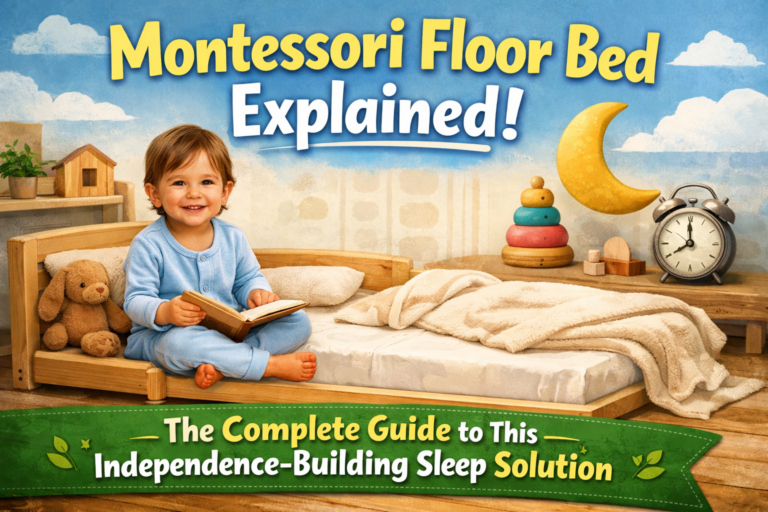
If you find yourself wondering why your baby is taking such short naps, know that you’re not alone! Many parents feel frustrated about managing to get their little darling down for a nap and then having them wake up just minutes later. This will be confusing and tiring, especially when your baby seems to need some more rest than that. The good news is that short naps are often a normal part of a baby’s development.
When you understand more about the motives behind it, you can know how to get through that period better. In this guide, we will consider 6 common reasons for “Why is my baby taking short naps” and give you some tips on how to lengthen them for more restful sleep.
Why Is My Baby Taking Short Naps?
Short naps can be frustrating for both the baby and the caregiver, but they are very normal in early development. Here are 6 key causes of “Why is my baby taking short naps”.
The Baby Is Under 4 Months Old
Babies in the first 4 months of life have not yet established a regular sleep cycle. Newborns’ sleep cycles are much shorter than older babies and they only last about 30-45 minutes. This is because their sleep is generally lighter and they have not formed a systematic nap pattern yet.
Thus, you need to be patient during this phase. Parents can try to let the baby sleep in a swaddle as it can increase comfort for the baby. Brief naps are typical at this age, and they will lengthen with the baby’s growth.
The Baby Isn’t Tired Enough To Sleep
Babies sometimes have short naps simply because they are not tired enough. When a baby is too well-rested or hasn’t been awake long enough between naps, they might wake up after just a 20 to 30-minute doze.
Wake windows do change with age, but most babies by about 4 to 6 months need about 2 to 2.5 hours of wake time between naps. Engage them in various activities, such as tummy time or just light rough-and-tumble play, to get them tired for a good nap.
The Baby Is Too Tired To Sleep

However, an over-tired baby may find it hard to go to sleep. It has been documented that when parents let babies become over-tired, there is the production of cortisol in the body making them extremely aware of their surroundings1. Thus, it becomes very difficult for them to sleep. Without question, these stressful hormones can interfere with the proper sleep pattern and probably cause a baby to be up earlier than expected.
Therefore, what you ought to do is observe very closely for some of the following signs of sleep readiness e.g. yawning, rubbing eyes, or fussy behavior. Then try to place him down for a nap before he looks very tired. An overtired baby usually does short naps and simply changing their napping times may be effective.
The Baby Is Hungry
In many cases, babies take a short nap and wake up so soon can be attributed to hunger. Infants particularly those 6 months and below have very little tummies and often have to be fed. Of course, a hungry baby will not keep sleeping that long.
Make sure to feed the baby 30-45 minutes before the baby’s naptime in order to ensure that they will be well-fed and comfortable. Therefore, they will not awaken soon after due to hunger. When the baby is about 4-6 months of age, he should be fed every 2-3 hours.
The Environment Isn’t Suitable For Sleeping
“Why is my baby only taking short naps?” The environment will play an important role in the quality of a baby’s sleep. If the room is too bright, noisy, too hot, or cold, your baby will most likely wake up before they have had enough rest. Especially, it’s difficult for babies to sleep during fireworks or thunderstorms.
Make the room comfortable for your baby to sleep. You can consider using blackout curtains, a white noise machine, and adjusting the room temperatures around 68-72°F. A quiet and darkened room can help your baby sleep longer.
It Is The Third Nap In Day

The third nap is also naturally shorter, especially with a baby who is around 6–8 months. As your baby grows older, his sleeping needs gradually alter and the third nap tends to get a bit more similar to a “cat nap“. Your baby may be sleeping less during this nap because bedtime is near and he requires less rest.
If your baby consistently takes a very short third nap, try adjusting their general napping pattern. Gradually shorten the third nap, and make their bedtime a little bit earlier if this helps. If they are over 9 months, it may be time to drop from 3 to 2 longer naps during their day.
Understanding Baby Sleep Cycles: The Science Behind Short Naps
To truly understand why babies take short naps, it helps to know how their sleep works. According to sleep researchers, baby sleep cycles are fundamentally different from adult sleep cycles, and this explains much of the napping frustration parents experience.
How Baby Sleep Cycles Work
Newborns and young babies have sleep cycles that last only 30-50 minutes, compared to 90-120 minutes for adults. Each cycle includes both light sleep and deep sleep phases. The challenge comes during the transition between cycles. When babies briefly wake between cycles (which is normal and happens to everyone), they haven’t yet learned to connect one cycle to the next without fully waking.
The National Sleep Foundation explains that around 4-6 months, babies begin developing the ability to link sleep cycles together. This is when you might notice naps naturally lengthening from 30-40 minutes to 1-2 hours. However, this skill takes time to develop, and some babies master it faster than others.
Why This Matters for Naps
During daytime naps, babies are more easily disrupted than during nighttime sleep. The environment is lighter, noisier, and their bodies produce less sleep-inducing melatonin during the day. This combination means babies often wake fully at the end of one sleep cycle (around 30-45 minutes) rather than transitioning smoothly into the next cycle.
Understanding this biological reality helps parents adjust their expectations and approach nap challenges with more patience and realistic goals.
How Is A Too Short Nap?
It is considered “too short” if a nap lasts less than 40 minutes. Ideally, a baby should complete one sleep cycle, which takes roughly about 50–60 minutes in newborns and goes up to even 90 minutes for older babies. Where the wake-up time for your baby occurs before the completion of a full cycle, they miss out on deeper, restorative sleep stages that help them in growth and development.
Dr. Deborah MacNamara, clinical counselor and author of Rest, Play, Grow says:
“A nap shorter than 40 minutes often does not provide enough time for babies to enter restorative sleep, which is crucial for their emotional regulation and cognitive development.”
Too short naps make for cranky or overtired babies because they haven’t had enough rest to revitalize. This generally means having a fussy baby during the day. Your baby will even have more difficulty sleeping during subsequent naps or bedtime.
Practical Tips to Help Lengthen Your Baby’s Naps
While short naps are developmentally normal, there are strategies that can help encourage longer sleep as your baby’s nervous system matures.
Create Optimal Sleep Conditions
Darkness: Use blackout curtains to mimic nighttime conditions. Even small amounts of light can signal to your baby’s brain that it’s time to be awake.
White noise: A consistent sound helps mask household noises that might startle your baby awake during light sleep phases.
Temperature: Keep the room between 68-72°F. Babies sleep best in slightly cool environments.
Perfect Your Timing
Watch your baby’s wake windows carefully. For babies 4-6 months, aim for 1.5-2.5 hours between naps. Being even 15 minutes off can mean the difference between a 30-minute nap and a 90-minute nap.
The “Pause” Technique
When your baby stirs at the 30-45 minute mark, resist the urge to rush in immediately. Give them 5-10 minutes to see if they’ll resettle on their own. Many babies make noise and move during sleep transitions but will fall back asleep if left undisturbed.
Be Patient and Consistent
According to pediatric sleep specialists, it typically takes 2-3 weeks of consistent routine for new sleep patterns to establish. Don’t expect overnight changes. Small improvements over time are the goal.
FAQs
As babies grow, their naps will get longer. Between 4–6 months, babies begin to consolidate into 2 or 3 naps, which can be 1–2 hours in length. By 6–9 months, they usually take 2 naps scheduled a day, lasting about 1–2 hours. Most babies take 2 solid naps totaling up to 2 hours between 9–12 months and transition to 1 afternoon nap of 1.5–3 hours after 12 months.
It is based on some factors. If they are still showing signs of tiredness, such as fussiness, or rubbing their eyes, it is normally a good idea to try to help them return to sleep. You can do this by soothing them with gentle rocking, patting, or using white noise to create a sleep-conductive environment. However, if your baby seems alert and satisfied with the short nap, it might be good to let them stay awake and enjoy playtime.
Yes, this is still within the range of normal development. While many 6-month-olds begin taking longer naps, some continue with short naps until 8-9 months or even later. Every baby develops sleep consolidation skills at their own pace. As long as your baby seems happy and well-rested overall, and is sleeping adequately at night, short naps alone aren’t cause for concern. However, if your baby seems chronically overtired or fussy, consult your pediatrician.
Generally, you should let your baby sleep as long as they need during naps, with one exception: if a late afternoon nap is interfering with bedtime. If your baby naps past 4 PM and then has trouble falling asleep at their regular bedtime, you might gently wake them to protect nighttime sleep. Otherwise, let your baby’s body determine nap length. Well-rested babies actually sleep better overall, and restricting daytime sleep rarely improves nighttime sleep.
Bottom Line
Short naps can feel frustrating, but they’re a normal part of infant development, especially in the first six months. Understanding that baby sleep cycles are shorter and less organized than adult sleep helps you approach nap challenges with patience and realistic expectations. While you can create optimal conditions for longer naps through consistent routines, appropriate wake windows, and a sleep-friendly environment, remember that some babies naturally take longer to develop nap consolidation skills. Focus on your baby’s overall well-being rather than comparing nap lengths to other babies. If your baby is generally happy, meeting developmental milestones, and sleeping reasonably well at night, their short naps are likely just fine. Trust that as your baby’s nervous system matures, naps will naturally lengthen. If persistent sleep issues concern you, consult your pediatrician for personalized guidance.
Source
- What Is Cortisol? (2022, December 13). WebMD. https://www.webmd.com/a-to-z-guides/what-is-cortisol ↩︎






